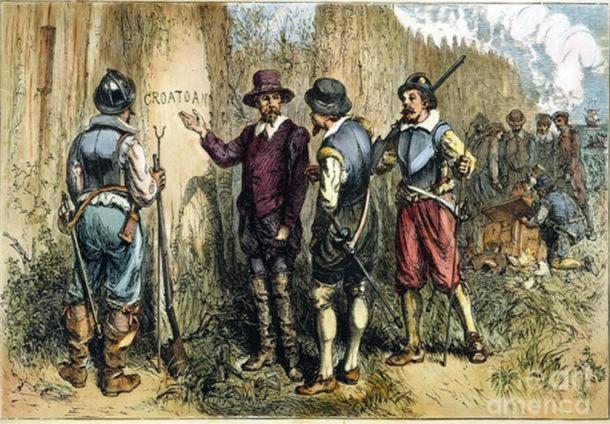Authors:
Historic Era: Era 2: Colonization and Settlement (1585-1763)
Historic Theme:
Subject:
Spring 2010 | Volume 60, Issue 1


Authors:
Historic Era: Era 2: Colonization and Settlement (1585-1763)
Historic Theme:
Subject:
Spring 2010 | Volume 60, Issue 1

One hot august day in 1590, the heavily armed privateer Hopewell dropped anchor off the Outer Banks of North Carolina. John White had returned to resupply the 118 men, women, and children whom he had left on Roanoke Island three long years earlier.
Sweating and cursing the humidity, White and his men left their ship and rowed toward the island. Crewmen sounded familiar tunes on trumpets to alert the colonists, but not a single human figure was seen. Only the endless beating of waves along the shore and wind gusting through the tall pines met their calls.
The landing party made its way through the woods to the settlement at the island’s northern end. Bracing himself for the worst, White entered the clearing where he had parted from the colonists, including his daughter, Eleanor Dare, and baby granddaughter, Virginia.
He found the settlement deserted, weeds and vines sprouting where houses had once stood. The houses themselves had been carefully dismantled and removed. Gone, too, were the fort’s small cannon; buried chests were found, containing some of the colonists’ possessions (including White’s). All the evidence suggested a planned and orderly withdrawal.
Cut into the bark of a tree, White discovered the letters CRO. On a post at the entrance to the stockade, someone had carved “in fayre” capitals the word “CROATOAN,” which gave him reason to believe that the colonists had left for the island of that name 50 miles to the south, inhabited by friendly Indians. White pleaded with the Hopewell ’s captain, Abraham Cocke, to sail for Croatoan the next day.
For an update on the latest, see "Archaeologists at Roanoke Unearth New Clues" in this issue.
Overnight, a great storm blew up and snapped their anchor cables, nearly driving the Hopewell onto the reefs lining the Outer Banks. With his anchors gone, provisions dwindling, and a tempest that showed no signs of abating, Cocke decided to head out to winter in the West Indies, then return in the spring. But continuing gales forced the ship far into the ocean, persuading him to set a course for the Azores and then back to England. The bitterly disappointed White knew that it was highly probable that he would never see his family, friends, and fellow venturers again.
The story of the Lost Colony has fascinated people across four centuries and remains one of the enduring mysteries of early America, memorialized in pageants and works of history and fiction. Did the colonists move to Croatoan Island and live with the Indians, as White believed, or did they settle elsewhere? Where did they go, and what happened to them? A new interpretation of the evidence suggests that the prevailing explanation may be wrong.
More than 30 years ago, the eminent